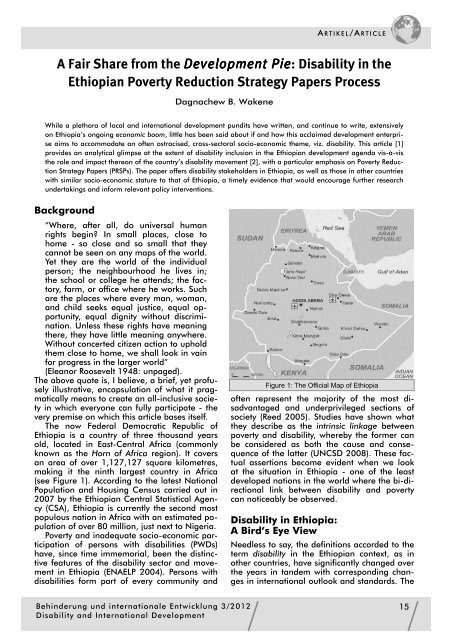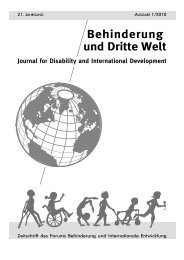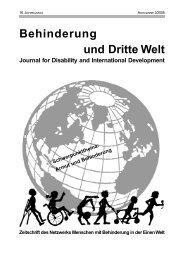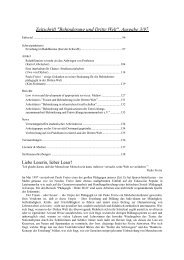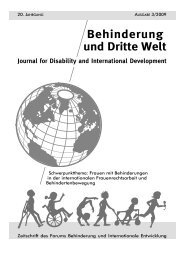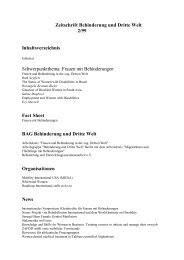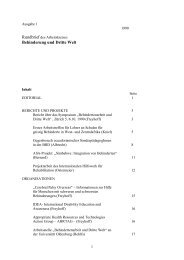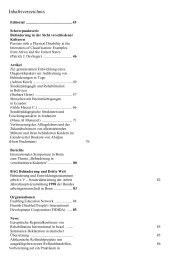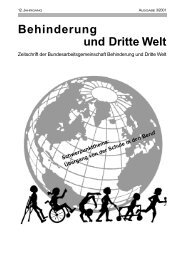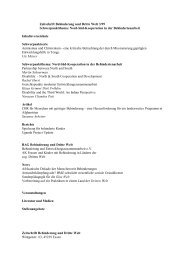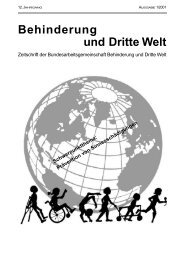Behinderung und internationale Entwicklung Disability and ...
Behinderung und internationale Entwicklung Disability and ...
Behinderung und internationale Entwicklung Disability and ...
Create successful ePaper yourself
Turn your PDF publications into a flip-book with our unique Google optimized e-Paper software.
A RTIKEL/ARTICLEA Fair Share from the Development Pie : <strong>Disability</strong> in theEthiopian Poverty Reduction Strategy Papers ProcessDagnachew B. WakeneWhile a plethora of local <strong>and</strong> international development p<strong>und</strong>its have written, <strong>and</strong> continue to write, extensivelyon Ethiopia’s ongoing economic boom, little has been said about if <strong>and</strong> how this acclaimed development enterpriseaims to accommodate an often ostracised, cross-sectoral socio-economic theme, viz. disability. This article [1]provides an analytical glimpse at the extent of disability inclusion in the Ethiopian development agenda vis-à-visthe role <strong>and</strong> impact thereon of the country’s disability movement [2], with a particular emphasis on Poverty ReductionStrategy Papers (PRSPs). The paper offers disability stakeholders in Ethiopia, as well as those in other countrieswith similar socio-economic stature to that of Ethiopia, a timely evidence that would encourage further research<strong>und</strong>ertakings <strong>and</strong> inform relevant policy interventions.Backgro<strong>und</strong>“Where, after all, do universal humanrights begin? In small places, close tohome - so close <strong>and</strong> so small that theycannot be seen on any maps of the world.Yet they are the world of the individualperson; the neighbourhood he lives in;the school or college he attends; the factory,farm, or office where he works. Suchare the places where every man, woman,<strong>and</strong> child seeks equal justice, equal opportunity,equal dignity without discrimination.Unless these rights have meaningthere, they have little meaning anywhere.Without concerted citizen action to upholdthem close to home, we shall look in vainfor progress in the larger world”(Eleanor Roosevelt 1948: unpaged).The above quote is, I believe, a brief, yet profuselyillustrative, encapsulation of what it pragmaticallymeans to create an all-inclusive societyin which everyone can fully participate - thevery premise on which this article bases itself.The now Federal Democratic Republic ofEthiopia is a country of three thous<strong>and</strong> yearsold, located in East-Central Africa (commonlyknown as the Horn of Africa region). It coversan area of over 1,127,127 square kilometres,making it the ninth largest country in Africa(see Figure 1). According to the latest NationalPopulation <strong>and</strong> Housing Census carried out in2007 by the Ethiopian Central Statistical Agency(CSA), Ethiopia is currently the second mostpopulous nation in Africa with an estimated populationof over 80 million, just next to Nigeria.Poverty <strong>and</strong> inadequate socio-economic participationof persons with disabilities (PWDs)have, since time immemorial, been the distinctivefeatures of the disability sector <strong>and</strong> movementin Ethiopia (ENAELP 2004). Persons withdisabilities form part of every community <strong>and</strong>Figure 1: The Official Map of Ethiopiaoften represent the majority of the most disadvantaged<strong>and</strong> <strong>und</strong>erprivileged sections ofsociety (Reed 2005). Studies have shown whatthey describe as the intrinsic linkage betweenpoverty <strong>and</strong> disability, whereby the former canbe considered as both the cause <strong>and</strong> consequenceof the latter (UNCSD 2008). These factualassertions become evident when we lookat the situation in Ethiopia - one of the leastdeveloped nations in the world where the bi-directionallink between disability <strong>and</strong> povertycan noticeably be observed.<strong>Disability</strong> in Ethiopia:A Bird’s Eye ViewNeedless to say, the definitions accorded to theterm disability in the Ethiopian context, as inother countries, have significantly changed overthe years in t<strong>and</strong>em with corresponding changesin international outlook <strong>and</strong> st<strong>and</strong>ards. The<strong>Behinderung</strong> <strong>und</strong> <strong>internationale</strong> <strong>Entwicklung</strong> 3/2012<strong>Disability</strong> <strong>and</strong> International Development15


